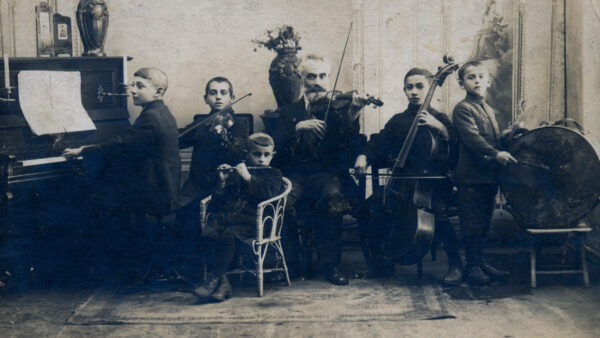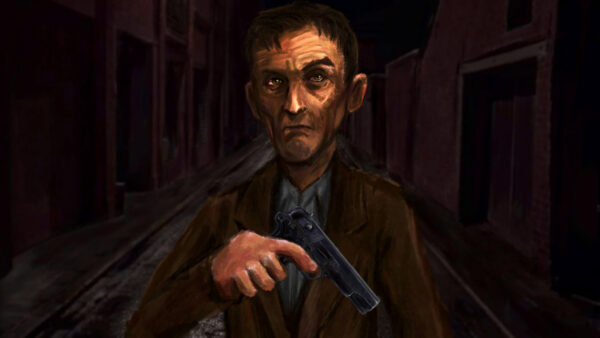Five Questions with The Rhapsody Director David Hoffert
2023-03-29

On Monday, April 3 at 9pm ET / 6pm PT, VisionTV presents the world television network premiere of the acclaimed documentary The Rhapsody. The award-winning, feature-length film tells a spellbinding story of survival and features a long-lost musical masterpiece, the discovery of a secret wartime diary and a 98-year-old artist reborn.






1. The animated reenactments of Leo’s experiences during the war as told through his diary entries are like paintings come to life on screen. What was the process like to include those in the film, and what were the challenges in capturing these very dark moments in order to tell his story?
DH: The discovery of Leo Spellman’s secret diary was a major turning point in the production of the documentary. It took almost a year and a half to translate the diary into English, with a new excerpt arriving every few weeks ending with a cliffhanger like a Dickens serialized novel. It was immediately apparent that this gripping first person account would have to feature heavily in the film, but the question was how.
We made the decision early on to animate the diary sequences accompanied by voiceover narration using Leo’s own words, rather than filming dramatic reenactments with actors, which felt too staged. I began by storyboarding several diary segments, then looked for animators. We approached an animation company in Poland, who provided a few short clips, then met with acclaimed animator Chris Landreth (Oscar winner for the NFB short Ryan). Chris hooked us up with some students at Seneca College and we tried different ideas looking for a style that worked.



In the end I ended up doing over 90% of the art and animation myself, even though I had never done that professionally before. I taught myself how to paint in Photoshop and the basics of animation. It was a steep learning curve, but it allowed me to completely fulfill my vision as a director.
First and foremost, I immersed myself in the evocative and haunting prose of Leo Spellman and used that as my springboard. When the diary begins, Leo is very much alert and in the real world and the art is somewhat detailed and naturalistic. As the war progresses and the months of hiding and dread take their toll, we can see Leo in the diary little by little losing his grip on sanity. The art reflects this as it becomes more expressionistic to reflect the thoughts running through his head.
It was a lot of work, but I am very proud of the enthusiastic response I have received regarding my animation.

2. Your father Paul Hoffert, who worked with Leo to record “Rhapsody 1939 – 1945”, had a close bond with him and says that hearing about Leo’s experiences in the war helped him process his own feelings about your family’s history. Did you have a similar experience when you began learning about Leo’s story and creating the documentary?
DH: When we started this documentary our main focus was on Leo as an artist and the incredible story of his long-lost music that was being resurrected as he approached one hundred years old. The fact that I am Jewish was not a significant factor for taking on this film – I would have been drawn to this story regardless of religion or ethnicity.
We were deep into shooting before I came to realize that my grandfather Sol (my father Paul’s father) had grown up in a town less than 150 kilometers away from Leo. As a youngster Sol sang in the choir at his town’s movie theatre. Leo played piano for silent movies in his own town and occasionally travelled to perform. It is actually possible that they performed together as children, which blows my mind.


Sol left Poland at thirteen years old and moved to Germany. He loved it there until, as a young adult, he went to see Adolf Hitler speak at one of his early mass rallies. He later told me that Hitler was so mesmerizing and so in control of the audience that he had to hold himself back from shouting “down with the Jews” himself. He knew Hitler meant business and he had to get out fast. Sol and his five brothers left Germany for the U.S. and elsewhere. His parents and sisters were all killed in the Holocaust.
I had heard these stories from him in my own childhood, but they seemed like ancient history to me at that time even though it was only thirty years earlier. Working on the documentary definitely increased both my knowledge and interest in what happened to my relatives and the Jews in general.
For the finale of the documentary we travelled with Leo’s daughter to film in Poland. While researching and preparing for this shoot I had the opportunity to visit my grandfather’s home town of Rzeszow, and even found the house his family grew up in. Suddenly this documentary I was making about someone else’s family became very personal.

On the same trip I had the extraordinary experience of being invited to the 70th anniversary of the liberation of Auschwitz, taking place in the concentration camp itself. I found myself there with the last remaining 300 survivors of the camp as well as several Presidents, Prime Ministers and Steven Spielberg. After many moving speeches we marched in a candle lit procession to the crematorium.
I now have a deep connection to my family and roots that never would have existed had I not directed this film. And for that I am blessed.
3. Leo’s daughter Helene shares her amazement at the ability of survivors to “not let the horror of inhumanity destroy your present and your future” and to “live their lives with celebration”. Was there a balance involved in focusing the film on celebrating Leo’s life through music and family, while also not shying away from showing the horrific reality of the Holocaust and his harrowing experiences?
DH: Finding the balance between the joy of music, the determination to survive and thrive, the inspiration and courage of heroes and the brute horror of war was one of the biggest challenges of shaping and editing this film.
Our focus from the beginning was to tell the story of an artist finding success and artistic liberation near the end of a long life. This uplifting tale is matched by the inspirational courage shown by his actions tackling some of the most challenging circumstances we can imagine. But, especially after the diaries were discovered, there was no way we could avoid the harsh details of his horrific war-time hardship and suffering.


As a director and editor it took a long time to find the right balance. The film switches back and forth between the harrowing diary story and the modern day music storyline. An effort was made to always come back to the positive and enlightening, culminating with the joy of liberation, the triumphant performances of Leo’s composition, and the celebration of Leo’s life and music in his hometown of Ostrowiec.
Along the way there were sometimes difficult decisions to be made in the editing room. There were some very powerful and emotional scenes that ended up on the cutting room floor because they interfered with the overall arc and flow of the film as a whole. This is one of the hardest things a filmmaker has to do – but ultimately the final viewing experience is more important than any individual sequence.
4. What is the significance of original music and other creative works coming out of experiences during the Holocaust and the importance of keeping the memories of survivors like Leo alive?
DH: Leo loved music. Before and after the war it was his whole life. And telling his holocaust story as a piece of music was one of the most important and cathartic things he ever did. But after a single performance he locked it in the bottom of a trunk and it would have been lost forever had it not been rediscovered by a musicologist from the United States Holocaust Memorial Museum.
The memories were very painful for Leo to dredge up. During the rehearsal and recording of the CD it was clear that while he was hearing his composition played he was reliving some of the worst moments of his life.

At the same time, Leo finally came to realize how much his music and the story it represents means to the world. He could see the emotion his work stimulated from audiences at live performances. He received enthusiastic feedback and acknowledgment from friends and strangers incredibly moved by his artistry and everything it represents. And he finally knew that it was worth it.
It is imperative that stories of hardship and triumph be told so that future generations have the opportunity to learn from the mistakes of the past. Unfortunately the world still has Holocaust deniers, racists and dictators. The truth must be told. Leo’s music and diary, which both came so close to being forgotten forever, are now being heard throughout the world and making an impact wherever they go.
5. How has knowing Leo, working closely with him and his family and sharing his story personally impacted you?
DH: When I met Leo Spellman he was ninety-eight years old. He was funny, a natural storyteller, a quick wit, a great musician and a force to be reckoned with. He was a joy to be with and rarely talked about the Holocaust unless he needed to for the film.
First and foremost he was deeply involved with Paul in creating the recording of his composition Rhapsody 1939 – 1945. For almost six months they worked together every week on the arrangement and preparation for the CD. Leo would play my father’s grand piano far better than you would expect from someone almost one hundred years old and his eyes would light up every time. And when he got to see his music performed at the Ashkenaz Festival followed by an adulatory standing ovation, it was like a dream come true.

So when I think of my time spent with Leo this is mostly what I think of. Good times. Fun times.
But I am also incredibly moved and inspired by his strength of character and determination against all odds. I worked on this film over a period of ten years, so Leo’s story is deeply embedded in my head and will never leave.
Discover Leo Spellman’s inspiring and astonishing story in The Rhapsody Monday, April 3 at 9pm ET / 6pm PT.